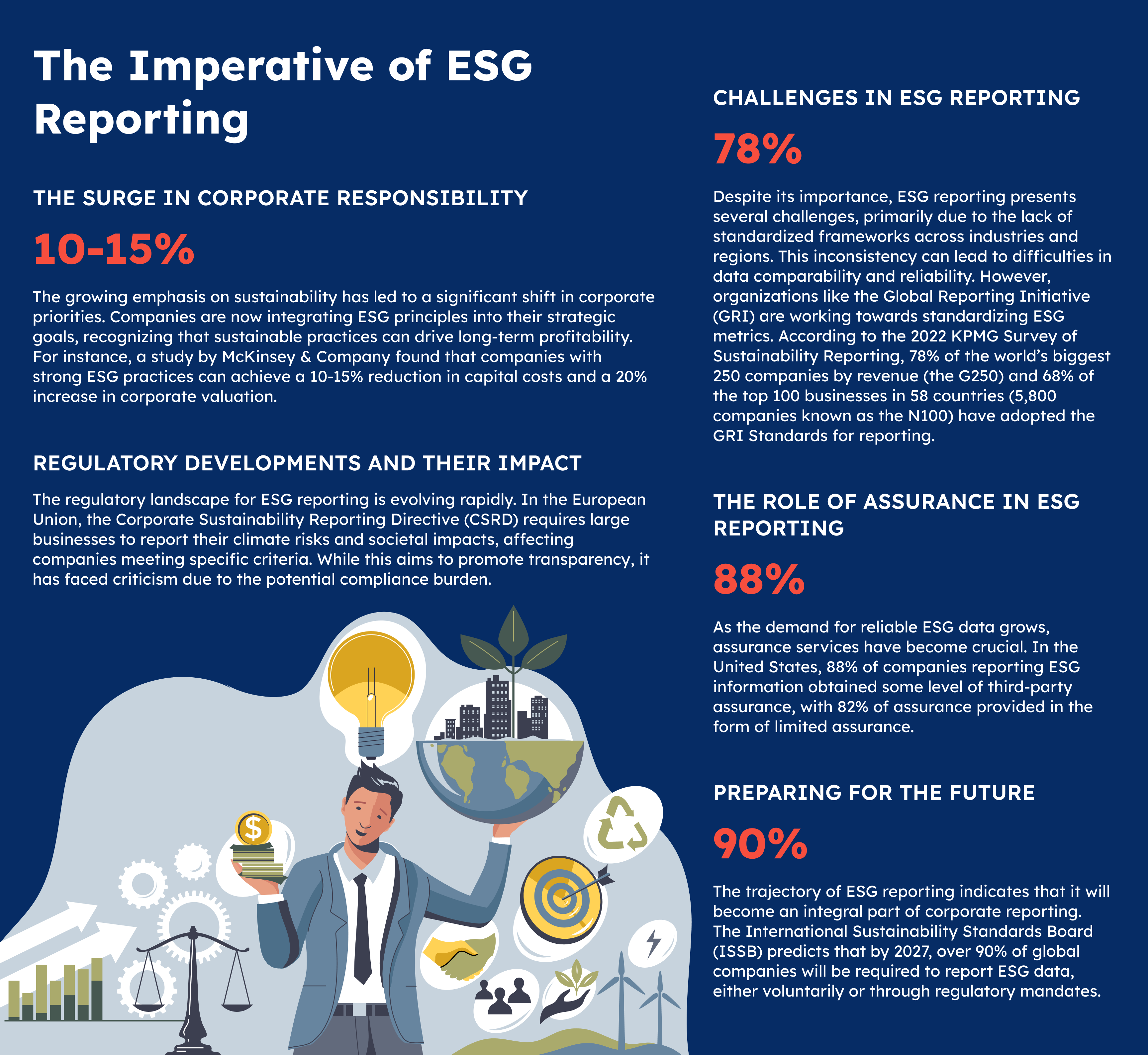ESG reporting encompasses the disclosure of a company’s performance in areas related to environmental impact, social responsibility, and governance practices. This form of reporting has gained prominence as stakeholders—including investors, clients, and regulators—increasingly demand transparency and accountability. A global study published in February by the Association of International Certified Professional Accountants and the International Federation of Accountants found that 98% of companies now publicly disclose some level of ESG information, with 69% obtaining some level of assurance.


The Surge in Corporate Responsibility
The growing emphasis on sustainability has led to a significant shift in corporate priorities. Companies are now integrating ESG principles into their strategic goals, recognizing that sustainable practices can drive long-term profitability. For instance, a study by McKinsey & Company found that companies with strong ESG practices can achieve a 10-15% reduction in capital costs and a 20% increase in corporate valuation.
This shift underscores the critical role of accounting firms in facilitating the transition to sustainable business models. Xerosoft Global assists businesses in assessing their environmental impact, social initiatives, and governance structures, translating data into comprehensive reports that comply with international standards.

Challenges in ESG Reporting
Despite its importance, ESG reporting presents several challenges, primarily due to the lack of standardized frameworks across industries and regions. This inconsistency can lead to difficulties in data comparability and reliability. However, organizations like the Global Reporting Initiative (GRI) are working towards standardizing ESG metrics. According to the 2022 KPMG Survey of Sustainability Reporting, 78% of the world’s biggest 250 companies by revenue (the G250) and 68% of the top 100 businesses in 58 countries (5,800 companies known as the N100) have adopted the GRI Standards for reporting.
Firms like Xerosoft Global utilize advanced data analytics and AI-driven solutions to streamline ESG practices, ensuring consistency and reducing the risk of errors.

Regulatory Developments and Their Impact
The regulatory landscape for ESG reporting is evolving rapidly. In the European Union, the Corporate Sustainability Reporting Directive (CSRD) requires large businesses to report their climate risks and societal impacts, affecting companies meeting specific criteria. While this aims to promote transparency, it has faced criticism due to the potential compliance burden.
Similarly, in the United States, the Securities and Exchange Commission (SEC) passed its climate disclosure rule in March 2024, requiring publicly traded companies to report on Scope 1 and 2 emissions when material.
These developments highlight the increasing importance of ESG reporting and the need for accounting firms to adapt accordingly.
The Role of Assurance in ESG Reporting
As the demand for reliable ESG data grows, assurance services have become crucial. In the United States, 88% of companies reporting ESG information obtained some level of third-party assurance, with 82% of assurance provided in the form of limited assurance.
This trend underscores the need for accounting firms to develop expertise in ESG assurance services, ensuring the credibility of sustainability reports. Xerosoft Global supports firms in this endeavor by offering tools and resources to enhance their assurance capabilities.
Preparing for the Future
The trajectory of ESG reporting indicates that it will become an integral part of corporate reporting. The International Sustainability Standards Board (ISSB) predicts that by 2027, over 90% of global companies will be required to report ESG data, either voluntarily or through regulatory mandates.
Accounting firms must invest in training, technology, and resources to support their clients’ ESG goals effectively. Building partnerships with experts and adopting robust data analytics tools will be crucial for firms aiming to stay competitive in the evolving landscape of corporate sustainability. Xerosoft Global encourages firms to embrace these changes, offering solutions that facilitate the integration of ESG reporting into their service offerings.

The significance of ESG reporting in today’s business environment cannot be overstated. Accounting firms that can provide clear, reliable, and actionable insights into sustainability practices will gain a competitive edge. By integrating ESG reporting into their services and leveraging advanced tools and expertise, such as those offered by Xerosoft Global, accounting firms can help clients not only comply with regulations but also drive positive change in their organizations and communities. This proactive approach positions accounting firms as essential partners in the global movement towards sustainability and corporate responsibility.
Reference:
- OBS Business. The Accounting Profession’s Crucial Role in ESG Reporting: Trends and Statistics in 2024
- UHY US. The Accounting Profession’s Role in ESG Reporting
- The Times. Brussels sprouts more red tape on reporting
- Wikipedia. Global Reporting Initiative

